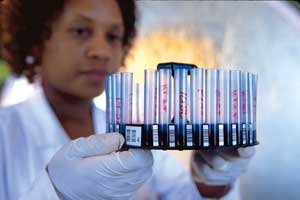IAVI scales up efforts to cross new frontiers
April 11, 2015 | Saturday | Features | By Rahul Koul Koul
IAVI scales up efforts to cross new frontiers
A grant of US$ 350,000 from GSK has added new muscles to the efforts of IAVI to support implementation of the Human Vaccines Project, a new public-private partnership
Each year, the persistent global diseases such as AIDS, tuberculosis and malaria, together kill more than 3.5 million people and infect millions more, despite impressive advances in treatment and prevention. Experts say that the successful vaccine development strategies developed in past might not work against a number of today's complex parasites, bacteria, viruses and cancers.
In the background of growing concerns over lack of solutions, the 35 experts from industry, academia, government and nongovernmental organizations had met on February 5-6, 2014 in California, and "concluded that the concept for a Human Vaccines Project was meritorious, timely and potentially transformative," the report stated. The group identified three major common challenges in vaccine research and development: an insufficient understanding of how to generate specific, potent, broad and durable immune responses in humans; an insufficient understanding of precise antigens required to produce desired protective immunity, and a need for a deeper appreciation of how best to optimize vaccine efficacy in newborns, the elderly and populations in the developing world.
They recommended that the Human Vaccines Project focus on mapping the human immune system into a "human immunome" to facilitate vaccine discovery, and on a comprehensive series of systematic human immunology-based clinical research studies with experimental vaccines aimed at solving the identified scientific challenges and overcoming the limited predictive powers of animal models.
"Creating an enabling environment for and implementing such trials, and ensuring close engagement with the vaccine industry and public sector research agencies, would be keys to the project's success," said report co-author Ian D Gust, professorial fellow, Department of Microbiology and Immunology, University of Melbourne, who chaired the meeting.
The February meeting was the first of three workshops to catalyze the project, with an initial focus on identifying key objectives to inform the project's scientific plan. The second workshop, held in July, focussed on organizational, management and financial questions to inform a business plan. The third workshop to be held soon will bring together key stakeholders and potential donors to review the scientific and business plans and prepare for a projected launch in 2015. The three initial workshops are funded by a grant to IAVI from the Robert Wood Johnson Foundation.
"There was a very strong consensus that we now have the tools to radically change the paradigm for vaccine development and usher in a new era in disease prevention," said workshop participant Dr MK Bhan, former secretary of the Department of Biotechnology, ministry of science and technology, government of India.
The business leaders from public and private sectors in July 2014, reviewed the Project's mission and goals, and recommended the Project be structured as a global, nonprofit research and development (R&D) consortium closely engaged with industrial partners, and affiliated with one or more academic centers conducting vaccine R&D (Expert Review of Vaccines, in press). The Project is currently in the process of establishing the principal hubs of such a consortium, including exploration of centers in the United States, Europe and Asia, to which leadership of the Project will then transition from IAVI, its initial catalyst.
"The Human Vaccines Project is driven by the rapid pace of technological advances in genomics, bioinformatics and structural and systems biology, and likely would not have been possible even five years ago. It is a tremendously exciting time in vaccinology as we move toward preventing very challenging global killers such as AIDS, TB, malaria, Ebola, and cancers. Science and innovation will get us the vaccines we need," said Mr Stanley Plotkin, emeritus professor of the University of Pennsylvania and chairman of the Human Vaccines Project Steering Committee.
Industry's support for sustained efforts
A grant of $350,000 from GSK has pumped new muscles to the efforts of IAVI to support implementation of the Human Vaccines Project, a new public-private partnership. Through the programme, it seeks to transform global disease prevention by collaboratively addressing some of the key scientific challenges in vaccine development across diseases.
The GSK grant will help to establish the Project's global consortium and plan its research program. The funding builds on a grant last year to IAVI by the Robert Wood Johnson Foundation for a series of workshops to explore how to accelerate development of vaccines through such project, by tackling the major scientific challenges impeding vaccine R&D through greater collaboration, increased knowledge sharing, and innovation. The first workshop, held in February 2014, focused on the scientific challenges to vaccine development, at which leading vaccine experts endorsed the Project's objectives and helped to frame its scientific plan.
Dr Wayne C Koff, chief scientific officer, IAVI and founding member of the Human Vaccines Project Board, announced the GSK grant during his recent visit to India. "A Human Vaccines Project focused on solving the major scientific problems impeding vaccine development could be transformative for efforts to help prevent these devastating infectious diseases as well as certain cancers. Industry involvement will be key to the success of the project, and we are excited that GSK has become the first corporate partner. Their support will help to engage other pharmaceutical partners to join this important new initiative," mentioned Dr Koff.
"For all that we have achieved with vaccines, there are still far too many diseases that we can't prevent and which have a devastating impact, particularly in the developing world," said Mr Emmanuel Hanon, senior vice president, Vaccines Research and Development, GSK. "The more we can do both individually and collectively to overcome the current scientific challenges the better. We are very pleased to support the Human Vaccines Project and we encourage others to join us in this potentially ground-breaking initiative."









